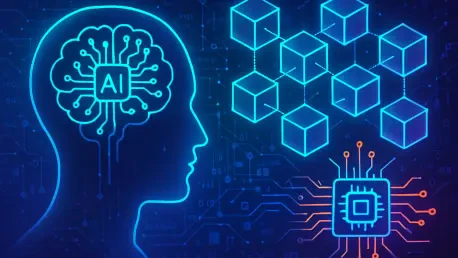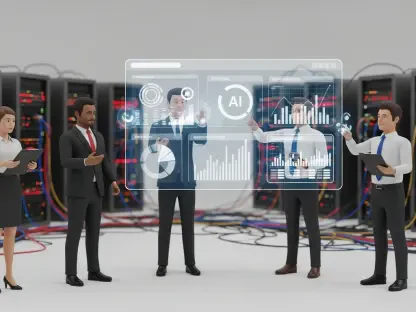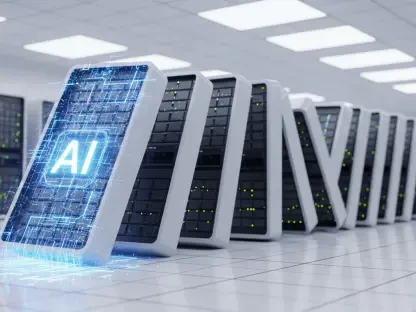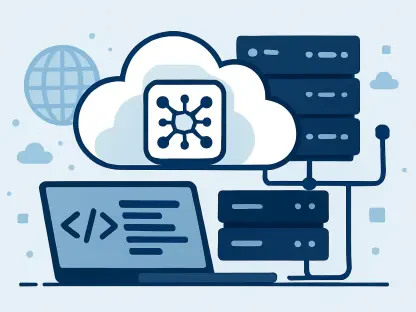In an era where digital innovation is accelerating at an unprecedented pace, the convergence of Artificial Intelligence (AI) and Blockchain technology stands out as a transformative force poised to redefine the very fabric of online interactions, data management, and systemic trust. These two powerhouse technologies, each remarkable on their own, are now merging to create a synergy that addresses critical limitations while unlocking new possibilities across various sectors. AI, often regarded as the intellectual engine of modern systems, equips machines with capabilities for deep analysis, automation, and nuanced decision-making through sophisticated methods like machine learning and natural language processing. Blockchain, by contrast, provides a decentralized, tamper-resistant framework that guarantees data integrity and fosters confidence in digital transactions. Together, they form a partnership that compensates for individual shortcomings—AI’s challenges with transparency and Blockchain’s struggles with scalability—paving the way for a more secure, efficient, and autonomous digital landscape. This collaboration is already leaving its mark on industries such as finance, healthcare, and supply chain management, hinting at a future where decentralized intelligence could fundamentally alter how value is exchanged and decisions are made. Yet, amidst the excitement, significant hurdles like regulatory ambiguity and technical constraints must be navigated to fully realize this potential. As market projections suggest substantial growth in the Blockchain AI sector over the coming years, the momentum behind this technological fusion signals a paradigm shift that demands attention from innovators and policymakers alike.
Exploring the Synergy of AI and Blockchain
Core Strengths and Complementary Benefits
The fusion of AI and Blockchain offers a compelling solution to the inherent weaknesses of each technology by leveraging their unique strengths in tandem. AI excels at processing vast amounts of data, identifying patterns, and making predictive assessments that can enhance decision-making across complex systems. However, its reliance on data quality and the often opaque nature of its algorithms can erode trust among users. Blockchain steps in as a counterbalance, providing an immutable ledger that ensures data remains unaltered and verifiable, thus offering a reliable foundation for AI to operate. This combination allows for systems where AI can dynamically adapt to new information while Blockchain maintains a transparent record of every action, fostering accountability. Such a partnership is particularly valuable in environments where trust is paramount, as it creates a robust framework that neither technology could achieve independently. The result is a digital ecosystem where efficiency and reliability coexist, setting the stage for groundbreaking applications.
Beyond addressing individual flaws, this synergy amplifies the potential for innovation by creating systems that are both intelligent and secure. Blockchain’s decentralized structure reduces the risks associated with centralized data storage, which often serves as a single point of failure vulnerable to breaches. Meanwhile, AI can optimize Blockchain operations by predicting network congestion or identifying inefficiencies in real time, thus improving scalability—a persistent challenge for Blockchain platforms. This mutual enhancement enables the development of adaptive solutions, such as smart contracts that evolve based on changing conditions rather than static rules. By combining AI’s analytical prowess with Blockchain’s trust mechanisms, industries can move toward automated processes that are not only faster but also inherently more dependable, reshaping expectations for how technology supports business and societal needs.
Enhancing Security and Trust
One of the most significant advantages of combining AI and Blockchain lies in the unprecedented level of security and trust they can deliver together. Blockchain’s core feature—an unalterable record of transactions—ensures that data fed into AI models remains authentic and free from manipulation, a critical factor in preventing biased or inaccurate outcomes. This is especially important in high-stakes fields like healthcare, where patient data integrity can directly impact diagnostic accuracy. Simultaneously, AI contributes by analyzing patterns within Blockchain networks to detect anomalies or potential threats, such as hacking attempts, in real time. This proactive defense mechanism strengthens the overall security posture, making systems less susceptible to attacks that could compromise sensitive information. As digital threats grow more sophisticated, this dual-layered protection becomes a cornerstone for building confidence in technology-driven solutions.
Equally important is the role this convergence plays in fostering trust among users and stakeholders in digital ecosystems. Blockchain’s transparency allows for every AI decision or transaction to be traced and audited, addressing the often-criticized “black box” nature of AI algorithms. This auditable trail is invaluable in scenarios where accountability matters, such as financial dealings or regulatory compliance, as it provides a clear record of how outcomes were reached. Furthermore, the decentralized nature of Blockchain ensures that no single entity controls the data, reducing the risk of misuse or monopolistic practices. By aligning AI’s decision-making capabilities with Blockchain’s verifiable framework, this partnership not only enhances security but also builds a foundation of trust that encourages wider adoption across diverse applications, from personal data management to enterprise-level operations.
Industry Impacts and Competitive Shifts
Transformative Applications Across Sectors
The practical implications of AI and Blockchain integration are already evident across multiple industries, demonstrating their versatility and transformative power. In finance, particularly within Decentralized Finance (DeFi), AI algorithms optimize trading strategies and manage liquidity pools with precision, while Blockchain eliminates intermediaries, slashing costs and accelerating transactions. This combination enables platforms that are not only more efficient but also accessible to a broader audience, challenging traditional banking models. Similarly, in healthcare, AI-driven diagnostics benefit from Blockchain’s secure storage of patient records, ensuring data privacy and accuracy in critical medical decisions. These advancements illustrate how the convergence can address sector-specific pain points, delivering tangible benefits that enhance both operational performance and user experience in real-world settings.
Another area witnessing profound change is supply chain management, where the duo’s capabilities streamline complex processes. AI provides predictive analytics to anticipate demand fluctuations or logistical bottlenecks, enabling companies to optimize inventory and reduce waste. Meanwhile, Blockchain offers a transparent, tamper-proof record of every step in the supply chain, from production to delivery, ensuring accountability and combating issues like counterfeiting. This level of visibility and foresight transforms how goods are tracked and managed, fostering trust among stakeholders and improving overall efficiency. As more sectors recognize the potential of this technological pairing, the ripple effects are likely to inspire innovative applications that redefine industry standards, pushing boundaries beyond what was previously thought possible.
Redefining Market Dynamics
The convergence of AI and Blockchain is reshaping competitive landscapes, creating distinct advantages for early adopters while posing existential threats to those slow to adapt. Technology giants with expertise in hardware and cloud services are well-positioned to capitalize on this trend, leveraging their infrastructure to support AI computations and Blockchain networks at scale. These companies are driving innovation by offering integrated solutions that cater to enterprise needs, solidifying their dominance in an increasingly digital economy. On the flip side, traditional financial intermediaries and centralized data brokers face significant disruption as decentralized systems gain traction, undermining business models reliant on control over information or transaction processing. This shift underscores the importance of agility in navigating a market where technological adoption can determine relevance.
Moreover, the competitive edge gained through this integration extends beyond large corporations to startups and smaller players who can now access tools previously out of reach. Decentralized AI marketplaces, for instance, democratize access to advanced algorithms, allowing innovators to develop and monetize solutions without the backing of major tech firms. Blockchain’s transparency further levels the playing field by ensuring fair and verifiable interactions in these ecosystems. However, the rapid pace of change also introduces risks for industries unprepared for the transition, as failure to integrate these technologies could result in obsolescence. As market dynamics continue to evolve, the divide between leaders and laggards will likely widen, emphasizing the strategic imperative to embrace this technological wave before it reshapes entire sectors irrevocably.
Challenges and Considerations
Regulatory and Ethical Dilemmas
As AI and Blockchain converge, they introduce a host of regulatory and ethical challenges that demand careful scrutiny and innovative solutions. One pressing issue is the tension between Blockchain’s immutable nature and data privacy laws, such as the General Data Protection Regulation (GDPR), which mandates the right to erasure. This conflict complicates compliance, as permanently stored data on a Blockchain cannot be deleted, raising questions about how to balance transparency with individual rights. Additionally, the decentralized structure of these systems blurs lines of accountability, especially in autonomous setups like Decentralized Autonomous Organizations (DAOs), where it remains unclear who bears responsibility for AI-driven decisions gone awry. Addressing these regulatory gaps requires new frameworks that can adapt to the unique characteristics of this technological fusion.
Ethical concerns further complicate the landscape, particularly around the potential for algorithmic bias and misuse of personal data within these integrated systems. AI models, even when trained on Blockchain-verified data, can perpetuate existing prejudices if not carefully monitored, leading to unfair outcomes in critical areas like hiring or lending. Moreover, the vast data-sharing capabilities enabled by this convergence heighten risks of privacy breaches if robust safeguards are not in place. Transparent audit trails offered by Blockchain provide a partial solution by ensuring traceability of AI actions, but broader ethical oversight is necessary to prevent harm. Policymakers, technologists, and ethicists must collaborate to establish guidelines that prioritize user protection while fostering innovation, ensuring that the benefits of this synergy are not overshadowed by unintended consequences.
Technical Barriers to Overcome
Despite the promise of AI and Blockchain integration, significant technical obstacles must be addressed to enable widespread adoption and sustainable growth. Scalability remains a critical bottleneck, as Blockchain networks often struggle to handle high transaction volumes without compromising speed or efficiency. AI’s computational demands exacerbate this issue, requiring substantial processing power that can strain existing infrastructures. Solutions like sharding or off-chain processing are being explored to alleviate these pressures, but they are not yet universally implemented. Overcoming these limitations is essential to ensure that integrated systems can support the scale needed for global applications, from financial networks to smart city ecosystems, without faltering under demand.
Energy consumption is another formidable challenge, given the resource-intensive nature of both technologies. Blockchain protocols, especially those relying on proof-of-work mechanisms, consume vast amounts of electricity, while AI training models require significant energy for data processing. This dual burden raises concerns about environmental sustainability at a time when green practices are increasingly prioritized. Collaborative efforts across industries and academic institutions are underway to develop energy-efficient algorithms and consensus mechanisms that reduce the carbon footprint of these systems. Innovations such as proof-of-stake protocols show promise, but broader adoption and refinement are needed. Tackling these technical barriers through strategic partnerships and research investments will be crucial to unlocking the full potential of this technological alliance in a responsible manner.
Future Horizons and Opportunities
Short-Term Wins and Innovations
The immediate benefits of AI and Blockchain integration are already manifesting in practical, impactful ways across various domains, signaling a strong foundation for broader acceptance. Enhanced fraud detection stands out as a key win, particularly in financial sectors where AI algorithms analyze transaction patterns to flag suspicious activity in real time, while Blockchain ensures a verifiable record of every interaction to prevent tampering. This dual approach significantly reduces the risk of financial crime, building trust among users and institutions alike. Additionally, smarter DeFi platforms are emerging, leveraging AI to optimize investment strategies and Blockchain to facilitate transparent, intermediary-free transactions. These early successes demonstrate the tangible value of this convergence, encouraging further investment and experimentation in diverse applications.
Another area of short-term progress is supply chain transparency, where the combined strengths of these technologies are streamlining operations with remarkable efficiency. AI’s predictive capabilities allow businesses to anticipate logistical challenges, such as delays or inventory shortages, enabling proactive adjustments that save time and resources. Meanwhile, Blockchain provides an unalterable ledger to track goods from origin to destination, ensuring authenticity and combating fraud like counterfeit products. This heightened visibility not only improves operational workflows but also strengthens consumer confidence in product quality and ethical sourcing. As these short-term innovations gain traction, they pave the way for deeper integration, setting a precedent for how AI and Blockchain can address pressing challenges with immediate, measurable impact across industries.
Long-Term Vision of Decentralized Intelligence
Looking further ahead, the long-term potential of AI and Blockchain convergence paints an inspiring picture of a digital world defined by decentralized intelligence and autonomous systems. Envisioned are autonomous agent economies where AI-driven entities conduct transactions, negotiate contracts, and manage resources independently, all secured by Blockchain’s immutable framework. Such systems could revolutionize industries by eliminating inefficiencies tied to human intervention, creating self-sustaining ecosystems that operate with precision and fairness. This vision extends to personal interactions as well, where individuals gain unprecedented control over digital identities and assets, free from the oversight of centralized authorities, fostering a sense of empowerment and security in an increasingly connected world.
Equally transformative is the prospect of smart cities powered by integrated AI-Blockchain systems, where urban infrastructure operates with seamless intelligence and transparency. Traffic management, energy distribution, and public safety could be optimized through AI’s real-time analytics, while Blockchain ensures data integrity and equitable access to resources across communities. This model promises not only efficiency but also a democratic approach to technology, where trust is embedded in the system rather than monopolized by a few powerful entities. Though challenges like scalability and regulatory alignment persist, the trajectory toward such a future suggests a profound shift in how societies function. By prioritizing collaboration and innovation, the long-term vision of decentralized intelligence offers a blueprint for a digital era that balances technological advancement with fairness and accountability.









